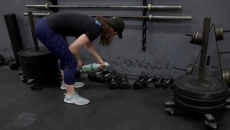Image courtesy of ShutterStock
Strong bones form the foundation of a healthy and active lifestyle, supporting our body's structure and protecting vital organs. However, as we age, our bones naturally undergo a gradual loss of density, making them more susceptible to fractures and breaks.
Bone weakness, or osteoporosis, is a common condition characterised by decreased bone mass and compromised structural integrity. In this article, we will explore the signs that indicate your bones may be weak, empowering you to take proactive steps to maintain bone health and prevent potential complications.
Frequent Fractures:
One of the most apparent signs of weak bones is experiencing frequent fractures or breaks, often from minor injuries or falls. Individuals with weakened bones may find that they suffer fractures more easily and that these injuries may take longer to heal than expected. If you notice an increased vulnerability to fractures, it's essential to seek a medical evaluation to determine the underlying cause.
Height Loss:
A decrease in height over time can be a sign of weak bones. As bone density diminishes, the vertebrae in the spine may compress, leading to a reduction in height. If you find that you are becoming shorter or notice a change in your posture, it is crucial to consult with a healthcare professional to assess your bone health.
Back Pain:
Persistent back pain, particularly in the middle or lower back, could be a warning sign of weak bones. As the spine loses its strength, it can lead to spinal fractures, resulting in chronic pain and limited mobility. Identifying the cause of the pain and addressing it promptly can help prevent further complications.
Brittle Nails:
Surprisingly, the health of your nails can offer insights into your bone health. Weak and brittle nails may indicate a lack of essential minerals like calcium and vitamin D, which are crucial for bone strength. Paying attention to the condition of your nails can prompt you to address nutritional deficiencies that may be affecting your bone health.
Receding Gums:
Just as bones can weaken, so can the jawbone. Receding gums or loose teeth can be indicative of a weakening jawbone. This may result from periodontal disease or a decrease in bone density in the jaw. Maintaining good oral hygiene and addressing any dental issues promptly can help preserve jawbone health.
Poor Posture:
If you find yourself slouching or having difficulty maintaining good posture, it could be linked to bone weakness. Weakened bones can affect the spine's alignment, leading to changes in posture and an increased risk of fractures and spinal deformities. Practicing exercises that promote core strength and posture can help alleviate strain on your bones.
Loss of Grip Strength:
A decrease in grip strength may be a subtle sign of weakening bones in the hands and wrists. While it can be attributed to various factors, such as ageing and muscle weakness, it's essential to consider bone health as a potential contributor. Exercises that target hand and wrist strength can aid in maintaining bone density in these areas.
Recognising the signs that indicate your bones may be weak is crucial for taking proactive steps to maintain bone health and prevent potential complications like osteoporosis. If you experience any of the mentioned signs or have concerns about your bone health, consult a healthcare professional for evaluation and appropriate guidance. Engaging in regular weight-bearing exercises, maintaining a balanced diet rich in calcium and vitamin D, and avoiding unhealthy habits like smoking and excessive alcohol consumption can all contribute to maintaining strong and healthy bones throughout your life. Remember, bone health is an integral part of overall well-being and should never be overlooked.






